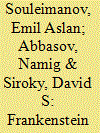|
|
|
Sort Order |
|
|
|
Items / Page
|
|
|
|
|
|
|
| Srl | Item |
| 1 |
ID:
163166


|
|
|
|
|
| Summary/Abstract |
Many scholars have suggested that organized violence in Chechnya has ended, and that Russia’s Chechenization policy and Ramzan Kadyrov’s presidency deserve the credit. We suggest that Putin has created a Frankenstein-like ruler over whom he risks losing control. As a result, the conflict only appears resolved, and we draw attention to both vertical and horizontal cracks in the foundation of Kadyrov’s rule that could lead to renewed violence. Vertically, the Chechen strongman and his growing clout in regional and federal politics have antagonized Russian siloviki. Horizontally, thousands of Chechens appear to be in a state of postponed blood feud toward Kadyrov, his clan, and the kadyrovtsy, his personal army. Backed by President Putin’s personal support, Kadyrov has put in motion a brutal machine of persecution over which some signs indicate he has lost control. Fear of extermination at the hands of the Kadyrov and his personal army has kept most prospective avengers at a bay. Once President Putin’s support wanes, locals will retaliate against Kadyrov and against Russian troops stationed in the republic, and Russian law enforcement circles will openly challenge Kadyrov’s rule. Putin’s support is only likely to wither if the costs of continued support (which grow with Kadyrov’s increasing independence) exceed the benefits (derived from an enforced peace). Either a renewed insurgency or ever more recalcitrant behavior would demonstrate a level of interest misalignment that could induce Putin to withdraw his support. Such a turn of events would render these horizontal and vertical cracks in the foundation of Kadyrov’s rule more noticeable and would likely to cause the frozen conflict in Chechnya to thaw, leading to a new civil war.
|
|
|
|
|
|
|
|
|
|
|
|
|
|
|
|
| 2 |
ID:
174661


|
|
|
|
|
| Summary/Abstract |
What appears to be Russia's recent series of successes in the Middle East has been considered by many commentators as a sign of its rising power in one of the world's key regions. Indeed, alongside Iran, Russia has helped its key ally, the Bashar al‐Assad regime, which had been at the brink of collapse in 2015, to regain control over much of Syria. Moscow has also provided support to General Khalifa Haftar to make significant advances against his opponents in the Libyan civil war. This article questions these widespread assumptions. It makes the point that these successes have been rather minor and are likely to be short‐lived in the face of the challenges both Arab republics face. In spite of tactical gains, Moscow has trapped itself in the messy politics of civil‐war‐torn nations with a host of economic, political and social problems. Should Moscow benefit from its presence in these nations, it has to engage substantially in the costly postwar reconstruction, international support and — particularly in the case of Syria — convoluted entanglement of the often‐contradictory interests of regional powers. This article claims that, while Russia has little to gain from engagement in these challenging tasks, it is likely to be dragged into them.
|
|
|
|
|
|
|
|
|
|
|
|
|
|
|
|
|
|
|
|
|